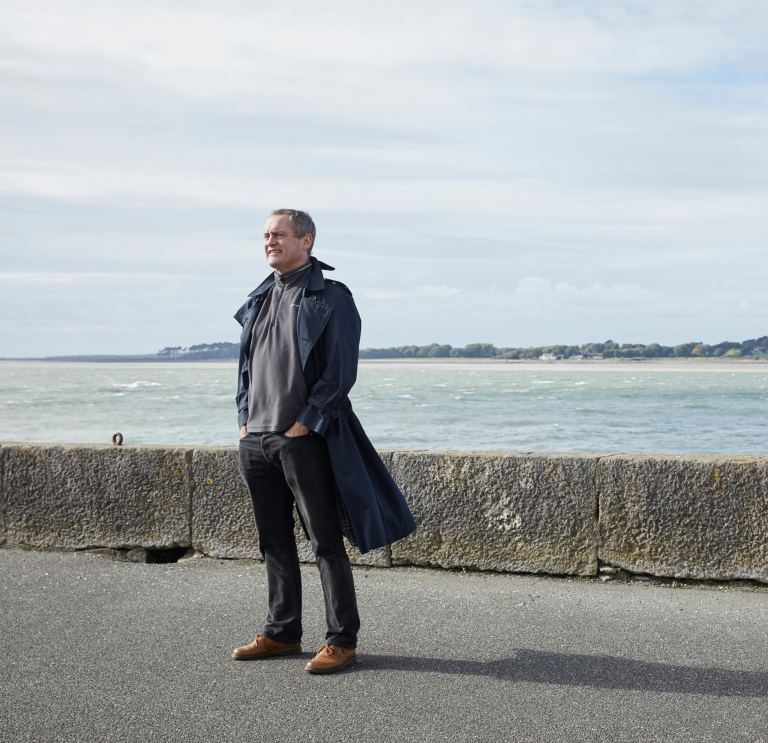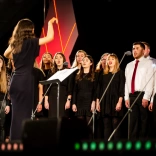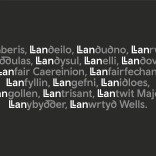We have a saying in Welsh, "cenedl heb iaith, cenedl heb galon"– "A nation without a language is a nation without a heart"– and the Welsh language is still very much at the heart of our national culture.
It belongs to all the people of Wales, whether they speak it or not; it’s part of our common heritage, from the place-names all around us to the National Anthem. It’s spoken by over half a million people, and understood by many more.


A few years ago, I made a television series to see what would happen if I travelled around Wales, speaking Welsh only. It was a linguistic experiment, but I was pleasantly surprised that even in areas that were predominantly English speaking, people knew more Welsh than they thought – and were willing to use it with me, even if they had only a few words.
Welsh is spoken by nearly 30% of the population in Wales as a whole, and in many areas you'll hear it used alongside English on the streets, in the shops and on the buses. (There’s also a sizeable Welsh diaspora in England – I myself was brought up in the Welsh speaking community in London, where my family have lived since the 1880s.)
Welsh is now used alongside English in all spheres of life, and has equal status legally."
The Welsh Government recently announced its plans to ensure that the language has a million speakers once again by 2050. Every child in Wales now has the opportunity to learn Welsh, and the demand for Welsh-medium education has grown consistently, particularly in Cardiff and the South East.
As a result, the language has become more ethnically diverse than ever before, with speakers from Asian and African backgrounds as well as from other parts of Europe. But Welsh has always been an inclusive language. It includes loan-words from Latin, Irish, Norse, Norman French, and of course, English.


Its roots, however, are Celtic. Breton and Cornish are its nearest relatives, its 'sister languages'. Irish, Manx and Scots Gaelic are its first cousins. Welsh first emerged some 1,500 years ago, and the earliest Welsh literature dates back to the sixth century – some 800 years before the English of Chaucer!
Our national anthem picks out 'beirdd a chantorion' – the poets and singers – for special mention. That tradition continues to this day at the eisteddfod, an annual celebration of the language and its culture.


The National Eisteddfod of Wales is held in a different location in August each year and is the biggest arts festival of its kind. It includes learners’ competitions for those who are still striving to master the language. The Urdd Eisteddfod, held each May - June, is aimed at young people and attracts 40,000 competitors each year. Matthew Rhys, Bryn Terfel, Cerys Matthews, and Ioan Gruffydd are among those who have profited from their early experiences at this eisteddfod.
As the above names suggest, using Welsh is no bar to success beyond the border. In December 2018 Gwenwyn by Alffa became the first Welsh-language single to hit over a million Spotify streams, Mwng by the Super Furry Animals was the first Welsh-language album in the UK top 20, and the films Hedd Wyn and Solomon a Gaenor both received Oscar nominations.

Children’s programmes such as Sam Tân (Fireman Sam) originated on the Welsh-language TV channel S4C, and have been sold all around the world. More recently, the detective drama Y Gwyll (Hinterland) has done the same. But just as significantly, S4C and its radio counterpart BBC Radio Cymru now provide a Welsh-language window on Wales and the world for viewers and listeners at home, whether home is in Llandeilo or in London.
The Welsh language has always been ready to embrace new media. The first books in Welsh were printed back in the 1540s and 100 years ago there were 25 weekly newspapers published in the language. That tradition is continued today, not only by Y Cymro and Golwg in print, but also by news websites such as BBC Cymru Fyw and Golwg 360.
Welsh is now used alongside English in all spheres of life, and has equal status legally. Can we reach a million speakers by 2050? Why stop there? Welsh and English have coexisted in Wales for centuries now – and perhaps our long experience of bilingualism is something we can profitably share with the world as we reclaim our heritage.
Did you know that Welsh is the fastest growing language in the UK on Duolingo? There are other great apps out there too such as Say Something in Welsh. Why not take a course with learnwelsh.cymru, or combine your learning with a holiday and take a residential course at the picturesque Nant Gwrtheyrn Welsh centre?





